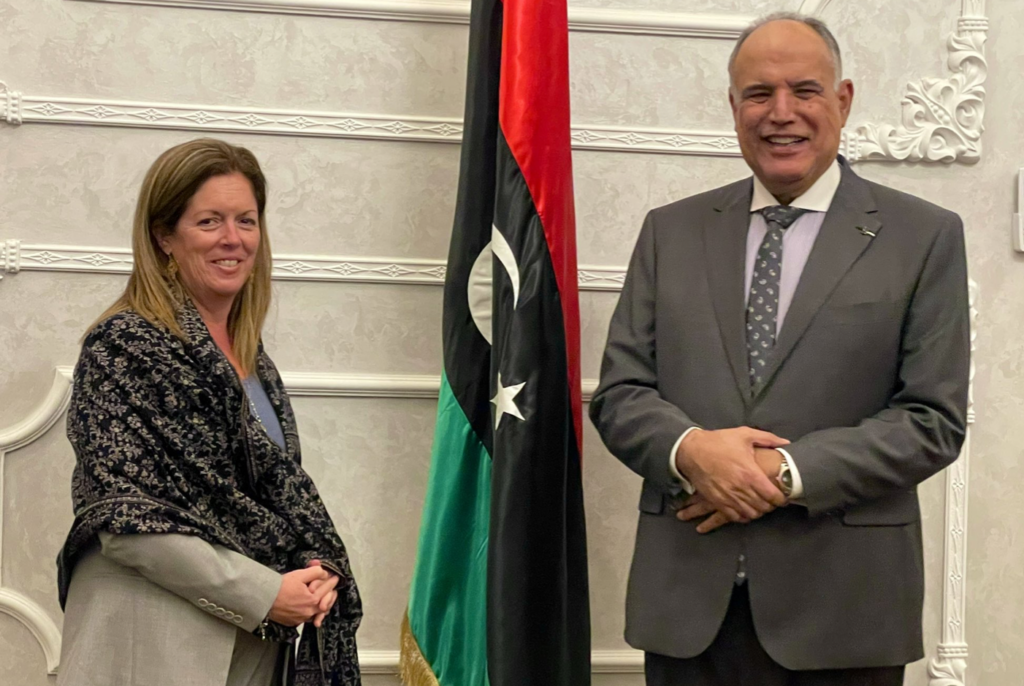Jan. 3, Libya HoR hears HNEC Head Al-Sayeh on elections fiasco as scores demonstrate near Parliament building, demanding clear election timetable.
Jan. 7, tribal leaders warn Gov’t oil exports to be halted if LNA salaries remain unpaid.
Jan. 8, GNU army Chief of Staff Al-Haddad, LNA interim Cmdr-in-chief Al-Nathouri meet in Sirte, discuss military unification.
SOCIAL ISSUES AND NATIONAL SECURITY
- Jan. 9, the Sudanese Rapid Support Forces (SRSF) announced that they had thwarted an attempt to smuggle a quantity of ammunition on the border with Libya that was on its way into Sudan. Two members of an arms and ammunition trade gang operating on the border between the two countries were arrested, according to an official statement issued by the SRSF;
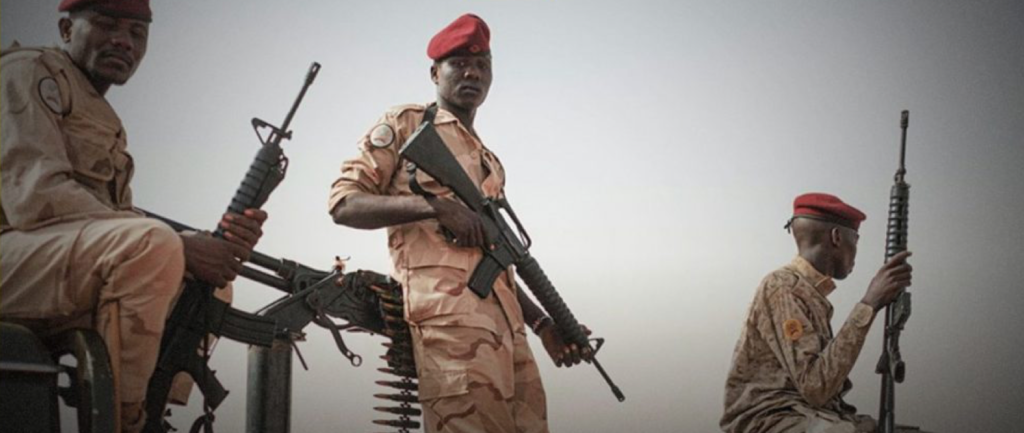
- Jan. 9, the European Union Naval Force Mediterranean Operation IRINI intercepted a merchant ship in the Mediterranean to verify and examine its documents, pursuant to United Nations (UN) resolution 2292. The inspectors opened several containers suspected of being loaded with illegal material. IRINI pointed out that the inspection process did not result in anything suspicious, so the ship was later allowed to sail away. It added that the inspection process, which took place in harsh weather conditions, took five hours;
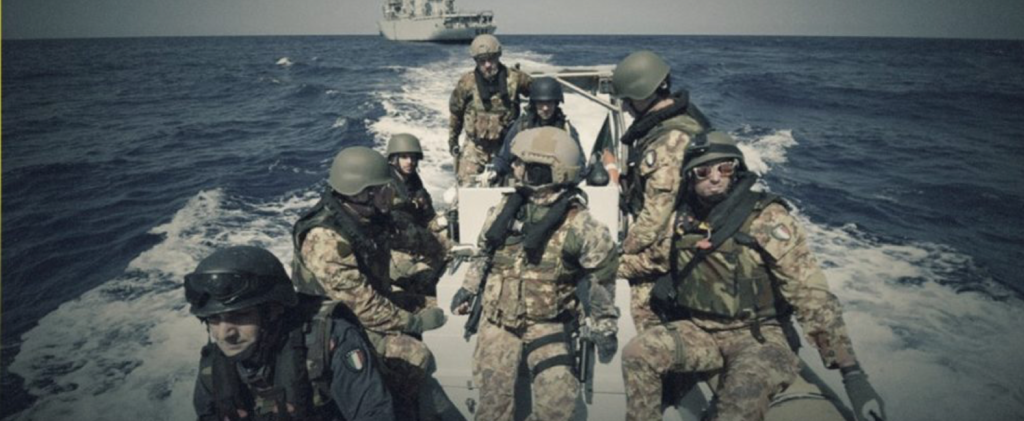
- Jan. 8, the Chief of Staff of the Government of National Unity (GNU) Major General Mohamed Al-Haddad met with the designated Commander in Chief of the eastern-based Libyan National Army (LNA), Lieutenant-General Abdulrazek Al-Nathouri. The two senior military officials met at the Mahari Hotel in Sirte, as they discussed the unification of the military institution. It is the second meeting between both parties in less than one month;
- Jan. 7, the Libyan tribes warned Al-Dbaiba’s government that they would halt oil exports if the government did not pay the salaries of the Libyan National Army (LNA). In a statement, the Libyan tribes in the cities of Sidra and Raslanov, in the Eastern Province, said they would take escalatory steps if Al-Dbaiba’s government did not respond to their “legitimate” demands;
- Jan. 7, a Turkey security delegation visited Tripoli and Misrata, informing officials of the transfer of a new batch of Syrian mercenaries outside the country early next week, according to Al-Arabiya news. The Turkish delegation met with Libya’s 5+5 Joint Military Commission (JMC) in Tripoli, and held a tripartite meeting with an “Italian security delegation in order to coordinate security and logistical efforts.”;
- Jan. 6, the General Electricity Company of Libya (GECOL) renewed its appeal to all state bodies, calling them to urgently intervene and take a firm stance against the repeated assaults on the country’s electrical network. The company also announced the theft of 2,100 m of copper wire over the last 24 hours in western Libya. It explained that 1,500 m of copper wire was looted from the Bin Saadan line at the Al-Azeel sub-station, while more than 600 m was stolen from the Tarhuna Distribution Department. It added that this caused the disconnection of feeding to about 20 transformers, resulting in power outages to a large number of residential neighborhoods;
- Jan. 6, the Libyan Internal Security Agency (ISA) announced that it had thwarted the smuggling of EUR 170,000 from Misrata International Airport to Turkey, by a Libyan air hostess. The Libyan security service stated that, “the smuggled money was found in the possession of the flight attendant, who works for Afriqiyah Airways and holds Libyan citizenship.”;
- Jan. 5, The Italian website ‘ItaMilRadar’, which specializes in monitoring military aircraft, reported that a Turkish plane had landed in northwestern Libya. The website stated that the Airbus A400M-180 plane departed Ankara, and landed in Misrata Jan. 5;
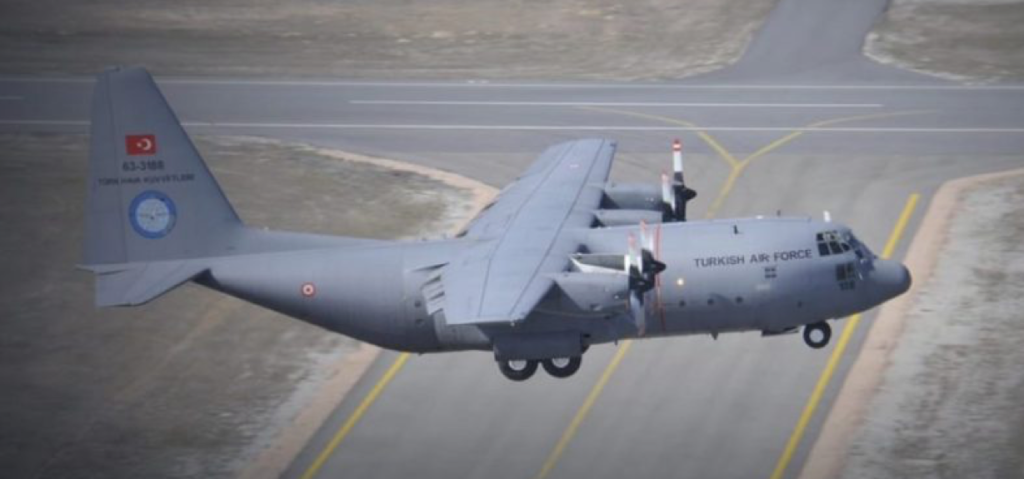
- The Tunisian Embassy in Libya announced that it supervised the deportation of 22 Tunisian youths, who were detained at the Anti-Illegal Immigration Center in Tripoli. It added in a statement Jan. 3, that the youths were deported through the Ras Jedir border crossing. They were arrested after attempting to migrate to Italy from Tunisia, and detained at the shelter two weeks ago;
NATIONAL POLITICS
- Jan. 7, Stephanie Williams, the UN Secretary General’s Special Adviser to Libya (SASG) held a meeting with the Libyan Political Parties Consortium, to review the bottlenecks that affected the electoral process in Libya. “I met a number of representatives of the Political Parties Consortium who demanded that the will of the 2,800,000 Libyans who registered to vote must not be usurped. I reiterated that the UN will stand by the Libyan people in their demand for an electoral process to end the long transitional period. I also stressed the need for determined efforts to push forward on national reconciliation and transitional justice,” she tweeted;
- Jan. 3, the Libyan Parliament held a plenary session, during which the Head of HNEC, Emad Al-Sayeh, gave a briefing about the reasons behind the failure to hold last month’s Presidential elections as scheduled. Dozens of people staged peaceful protests in the vicinity of Parliament building, demanding a clear date to be set for the elections without any further delay. During the session, Al-Sayeh said that one of the Presidential candidates submitted false documents, “we have evidence of his fraud.”;
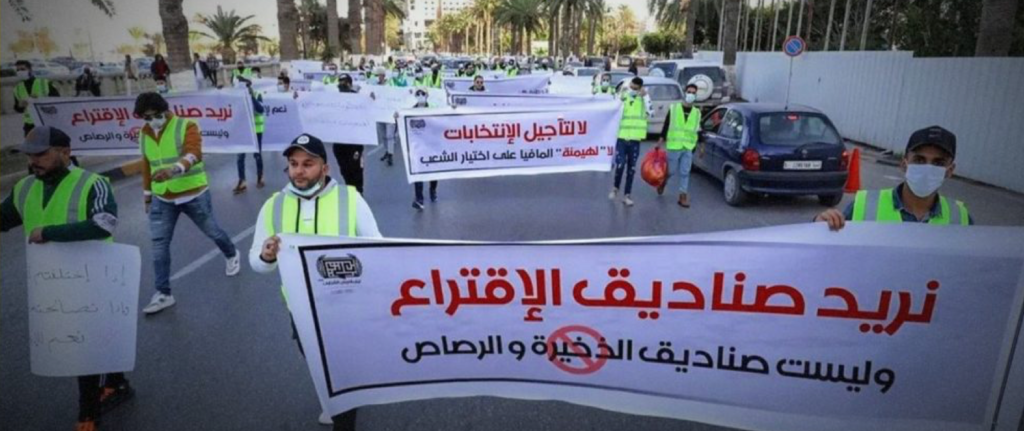
- Well-informed sources said that the Libyan Minister of Culture, Mabrouka Touki, was released Jan. 3 after being held in pretrial detention for four days pending investigations into charges of financial corruption.
INTERNATIONAL RELATIONS
- Jan. 9, the Turkish Minister of National Defence, Hulusi Akar, said that “although the region seems distant, Turkey has a 500-year history with Libya, a common history.” He added that when Tripoli was about to fall towards the end of 2019, a letter was written to five countries and NATO by the Government of National Accord (GNA), stating that the “only positive response to the letter written by Fayez Al-Sarraj was President Erdoğ” Noting that the work on military training and cooperation in Libya continues, Akar said that even if there is no election, it is a great achievement to reach this point;
- Jan. 8, Yassin Abousriouil, the Head of the Afro E-co conference said that Tunisia is set to host a joint Libya, Tunisia and Algeria conference from the 1st to the 2nd March this year. The event, which will be held under the slogan of “Africa towards a Free & Digital Economy”, is jointly organized by the International Five Consulting and OutBox Team in partnership with l’Union Tunisienne de l’Industrie, du Commerce et de l’Artisanat (UTICA) and the Libyan National Planning Council;
- Jan. 7, President of the France-Libya friendship group and Senator from Lot, Angèle Préville stated that she has had to intervene on the issues caused by the lack of a Consulate in Tripoli. She invited the French government to renew its trade relations with Libya. During her speech, Préville recalled that France maintains historic links with Libya, “Our country is particularly committed to the peace process in Libya, which enabled the creation of a Government of National Unity (GNU). She added that Paris reopened its Embassy in Tripoli in March, but that its consular section remains in Tunis;
- Stephanie Williams, the UN Secretary General’s Special Adviser to Libya (SASG) held a meeting with the Libyan Political Parties Consortium, to review the bottlenecks that affected the electoral process in Libya. “I met a number of representatives of the Political Parties Consortium who demanded that the will of the 2,800,000 Libyans who registered to vote must not be usurped. I reiterated that the UN will stand by the Libyan people in their demand for an electoral process to end the long transitional period. I also stressed the need for determined efforts to push forward on national reconciliation and transitional justice,” she tweeted;
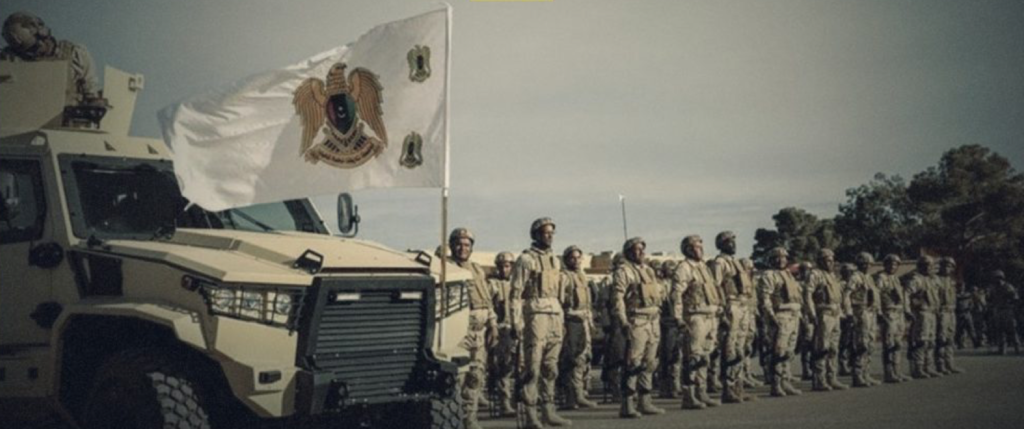
- Jan. 6, Egypt President, Abdel-Fatah El-Sisi met with the head of the Transitional Military Council of Chad, Mohamed Idris Deby in Cairo. They discussed the political and security situation in Libya, and its repercussions on regional security and stability. They agreed on the need for the political process in Libya, to include a clear mechanism for the withdrawal of all mercenaries and foreign forces from the country. They also stressed the need to ensure that weapons and military equipment belonging to mercenaries, are not smuggled into neighboring states;
- Jan. 5, Stephane Dujarric, Spokesman for the Secretary-General of the United Nations (UN), stressed the need for all mercenaries to withdraw from Libya as soon as possible. “We have always called on mercenaries who do not represent the Libyan armed forces to leave as soon as possible, and we do not see any obstacles for them to do so,” the UN official said. Libya’s 5+5 Joint Military Commission (JMC) is discussing the mechanisms for the withdrawal of foreign forces and mercenaries;
- Jan. 4, Turkey slammed the Greek Foreign Minister’s statements, over its 2019 maritime border agreement with Libya. “The anti-Turkey statements made by Greek Foreign Minister Níkos Déndias almost every day are populist and unrealistic claims that do not serve peace and stability,” Turkish Foreign Ministry Spokesman, Tanju Bilgiç said in a statement. “This provocative discourse is neither compatible with good neighbourly relations, nor with the spirit of the consultative talks we have relaunched with Greece,” Bilgiç added;
- Jan. 4, Deputy Head of the Libyan Presidential Council, Musa Al-Koni met with the Algerian Ambassador to Libya, Suleiman Shanine. The two discussed the latest developments in the Libyan crisis. In a statement, the Presidential Council said that Ambassador Shanine conveyed a “friendly message” from Algerian President, Abdelmadjid Tebboune to Al-Koni and the Libyan Presidential Council. During the meeting, Al-Koni stressed the “depth of the brotherly and historical relations between the two countries.” He praised Algeria’s role in resolving the Libyan crisis, through its communication with the international community and the various warring parties;
- The Tunisia customs authority at the border crossing of Ras Jedir, thwarted an attempt to smuggle narcotics from Tunisia to Libya. Inspection team agents at the border crossing halted the smuggling of 411 boxes of various narcotics, totalling 7,740 pills. These were hidden under the rear frame of a car, driven by a Tunisian national who was preparing to leave for Libya;
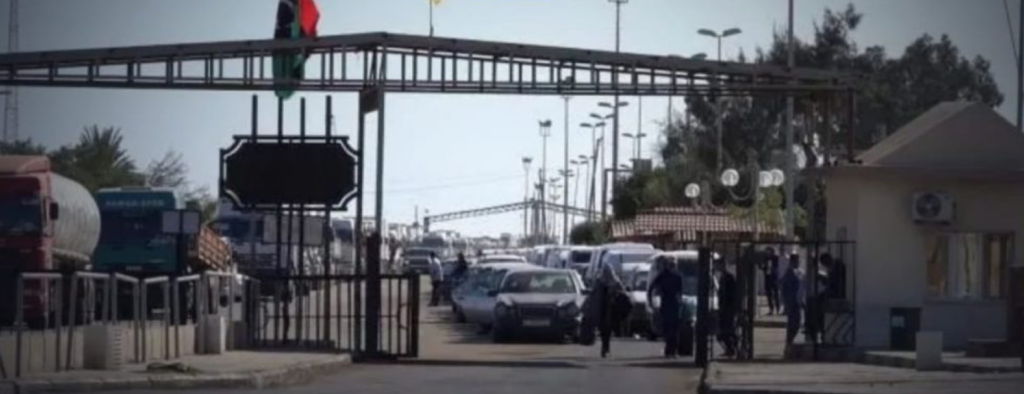
- Jan. 3, Italy Foreign Minister, Luigi Di Maio held a telephone call with his French counterpart, Jean-Yves Le Drian to discuss the electoral process and the political transition in Libya. The two FM’s affirmed their “strong support” of the Special Adviser to the UN’s Secretary-General (SASG) in Libya, Stephanie Williams. Di Maio also held a telephone call US Secretary of State, Antony Blinken. This comes as Rome remains concerned about the failure to hold elections in Libya, and stated he is working on trying to find a way out to revive the Libyan political process;
- The former Libyan Deputy Prime Minister and Minister of Interior, Al-Siddiq Abdel-Karim was arrested on the orders of the Attorney General yesterday, according to Libya Al-Hadath news. The Attorney General, Al-Siddiq Al-Sour confirmed that the former Libyan deputy PM was detained on charges of “seriously damaging public money” while serving in his former position. The former Deputy PM is a Libyan physician and politician who served as First Deputy Prime Minister between 14 November 2012 and 29 August 2014;

- Jan. 3, Stephanie Williams, the Special Adviser to the UN Secretary-General in Libya (SASG), met with the National Security Adviser of the Interim Government of National Unity (GNU) Ibrahim Bushnaf. Williams stressed the “importance of maintaining the momentum of the electoral process.” The meeting dealt with the latest developments in the country. The two officials agreed to “push towards national reconciliation, and build consensus around a national vision for Libya’s security,” Williams tweeted.
